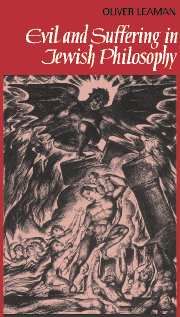6 - Spinoza
Published online by Cambridge University Press: 24 October 2009
Summary
It is a big jump from Gersonides to Spinoza (1632–1677), but perhaps not as large a jump as it might seem. Spinoza was a descendant of Spanish Jews and although he lived in the Netherlands he received a thorough grounding in the works of Spanish and later medieval thinkers. He has often, and accurately, been described as being one of the first of the modern philosophers and one of the last of the medieval philosophers, and it is certainly true that he embodies both approaches. He took Maimonides and Gersonides to what he took to be their logical conclusion, and the notion of a personal God largely disappears as a result. Even early on he was prepared to stick his neck out in his defence of what he took to be the truth, and when he produced good arguments to challenge the accepted views of the authorship of the Pentateuch he got into serious trouble with the Jewish community, who eventually excommunicated him. Spinoza certainly was not the only member of the Jewish community to get into trouble with its religious authorities. The spirit of the Renaissance and the influence of the medieval thinkers which so ably supported and helped to create that spirit led quite a few Jewish intellectuals into what were regarded as heresies. The reaction of the Jewish authorities might seem justifiable when one considers the desire which they had to keep a low profile in what was a fairly tolerant host community that had allowed them as refugees to set up home in the Netherlands, and the idea that people from the Jewish community were producing material which challenged not only Judaism but religion as a whole was not something which they wished to be widely disseminated.
- Type
- Chapter
- Information
- Evil and Suffering in Jewish Philosophy , pp. 121 - 145Publisher: Cambridge University PressPrint publication year: 1995

